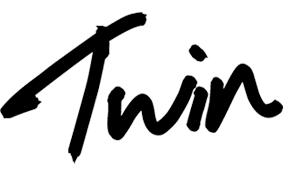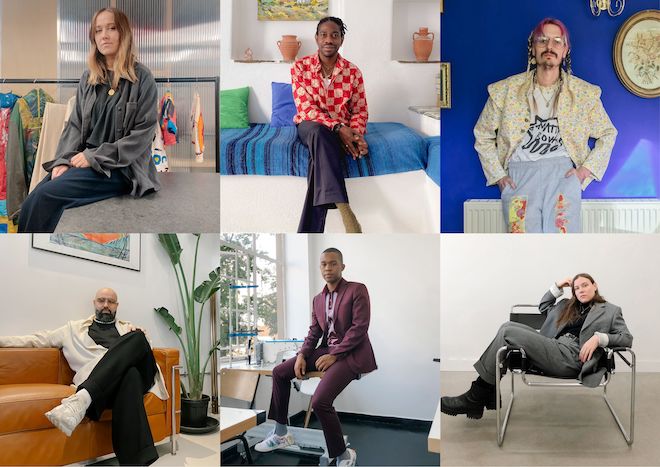Celebrating transparency and craftsmanship within the industry, the International Woolmark Prize 2021 nominees inspire hope for the future of fashion at time when innovation is needed more than ever.
This year’s theme, ‘Less is More’, focuses on slow, conscious and responsible design. Buzzwords these may be, but this year’s crop of design talent are showing how to put ambitious principles into action. The nominations brings together a group of bright young designers who have built innovative new models from the ground up.
Twin talks to Bethany Williams, Casablanca, Kenneth Ize, Lecavalier, Matty Bovan, Thebe Magugu about putting sustainability first and creating a green hype cycle.
Matty Bovan, United Kingdom
We have always tried to be sustainable, and to question where we source materials and artisan makers. We make everything in the United Kingdom and try and source as much as we can from the UK and even more locally, Yorkshire where we are based. We use deadstock fabrics, deadstock yarns, and end of line pieces alongside stock service fabrics. This is very important to myself, and my business, in a world where we have such huge amounts of materials and garments made every day – it’s important to rework and make something special.
I am very interested in upcycling, whether this be vintage pieces, or end of line, damaged fabrics; it excites me to be able to transform something under an artisan process. We rework all leftover fabric we have each season, alongside any excess yarns we have, nothing is ever disposed of and always reused in some way. Constantly experimenting with craft and process is very important to me and helps aid me in transforming materials that others may disregard. We use screenprinting in-house, embroidery and hand-dying to rework.
We are in a great place in fashion, with people asking more questions about who is making what we buy, who is putting love into these pieces. Traceability has always been very important to me, and I have always found it key to understand who we work with and where they are in the world. I try to work with artisans with hand skills. I try to make and treat a lot of textiles in-house. I like the touch of the hand on everything that comes under Matty Bovan.
Thebe Magugu, South Africa
If the current state of the world is enough to go on, I think it’s critical for anyone working in creative output of any kind to consider their sustainability practices. We are effectively destroying the world and sustainability is all our pledges to try to counter that destruction as much as possible.
I am very proud of the fact that most of our resources and production are made locally in South Africa. I am excited about the continuation of problem-solving through fashion, and the growing consciousness our industry is having towards its role in solving those problems. This is very particular to the younger generation especially.
Lecavalier (Marei-Eve Lecavalier), Canada
As a young generation of creators, we were put in front of a reality that fashion production and consumption was creating a lot of waste. My creativity comes also from a place where I want to make special pieces by reusing discard materials, there is so much material available out there and it is our duty to find new ways to be creative with it. I’m really proud that I have created a unique technique to weave discard leather. There is still so much for us to explore in terms of new weaving technics but also to explore of different fabrics. I’m looking forward to an era where the craftsmanship and savoir-faire will become more present. Fashion has always been about the garment, it’s not only a product and it’s not only hype.
Casablanca (Charaf Tajer), France
I think it’s important we all play a role in sustainable practices. The fact that we go from the idea to the creation of the garment is very special for me. My most proudest is that I am continuing the techniques of French classic fashion traditions. The whole process of creating the print and the fabrics. In terms of my own designs, I am optimistic about bringing more joy and gratitude through the clothing to people’s lives. I am optimistic that there is going to be more diversity and more acceptance towards people from different backgrounds. I think we have experienced a small part of the ongoing evolution that will create a better a future.
Bethany Williams, United Kingdom
Growing up my mum has always been very socially and environmentally conscious, and very caring, so this has been something that has been of interest to me from a young age. I want to create beautiful things but I always want to create something with a purpose, something that can support and protect the maker and the supply chain it is a part of. Each item we produce is made from recycled, deadstock, or organic materials and made in the UK and Italy. I feel it’s really important to have produce locally or close to home so that you know exactly where your garments are made and who exactly is making them.
I think our most recent collection titled ‘All Our Children’ is what I’m most proud of. Not just because of the outcome of the final collection of garments but also the groups of creatives and like-minded people that worked on the project alongside me. I really like the network of amazing people we are building through each collection and how positive and supportive the network is that we are surrounded by and look to grow and add to this network each season.
I’m always really excited to develop my skills and look forward to introducing new techniques each season, alongside the research into and introduction of new social manufacturing partners. I hope to expand my knowledge of social manufacturing, supply chain, and craft, and strive to share this at every opportunity to help drive change within industry. I feel the presence of change starting to happen within the fashion industry, and I’m optimistic that this will continue and build momentum towards a more environmentally and socially conscious system, however there is a long way to go yet.
Kenneth Ize, Nigeria
My love for the traditional Nigerian design textile culture of Aso Oke. Historically Aso Oke weaving created fabrics that were used to create everyday clothing that lasts for centuries and can be passed down from generation to generation. However, we started seeing less and less use of the textile except in occasion wear. With my brand I hope to bring the use of this textile to the forefront.
I’m also very passionate about the weaving villages we empower, and I hope to do all I can to continue to push opportunities for them to grow and develop
In a collaboration with Nigerian Product design firm nmbello Studio, we were able to redesign the loom. The old loom had never been redesigned or updated, the weavers had complained about the discomfort they felt while using it. By redesigning the loom we were able to birth new life into the industry as a new generation of weavers have come forward with an eagerness to learn and push Aso Oke weaving into a modern era.
I am most optimistic about the economic empowerment that is the bedrock of my atelier. We are currently building a factory to house many of our local artisans, creating more opportunities for local textile designers and establishing a more structured industry within Western Africa.



 Twitter
Twitter
 Tumblr
Tumblr
 YouTube
YouTube
 Facebook
Facebook
 Instagram
Instagram
